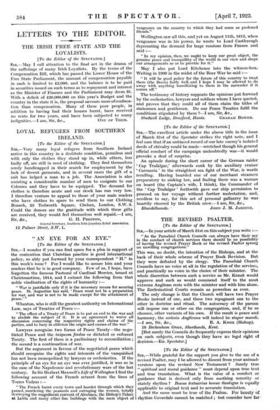"AN EYE FOR AN EYE."
[To the Editor of the SPECTATOR.]
Sta,—I wonder if you can find space for a plea in support of the contention that Christian practice is good international policy, so ably put forward by your correspondent "H." in this week's issue? For I would like to assure him and your readers that he is in good company. Few of us, I hope, have forgotten the famous Pastoral of Cardinal Mercier, issued at Christmastime, 1914, and I extract the following from that noble vindication of the rights of humanity :—
"War is justifiable only if it is the necessary means for securing peace. St. Augustine has said, • Peace must not be a preparation for war, and war is not to be made except for the attainment of peace.,
• Wheaton, who is still the greatest authority on International Law, says of Treaties of Peace :— " The effect of a Treaty of Peace is to put an end to the war and to abolish the subject of it. It is an agreement to waive all discussion concerning the respective rights and claims of the parties, and to bury in oblivion the origin and causes of the war."
Lawyers recognize two forms of Peace Treaty—the nego- tiated Peace and the iniquum foedus or dictated or enforced Treaty. The first of these is a preliminary to reconciliation ; the second is a continuation of war.
But the argument in favour of the negotiated peace which should recognize the rights and interests of the vanquished has not been monopolized by lawyers or ecclesiastics. If the
principle of an eye for an eye was ever justified, it was so in the case of the Napoleonic and revolutionary wars of the last century. In Sir Herbert Maxwell's Life of Wellington I find the following account of the French retreat from the lines of Torres Vedras :—
" The French burnt every town and hamlet through which they passed, murdering the peasants and outraging the women, totally destroying the magnificent convent of Alcobaca, the Bishop's Palace it Learn and many other fine buildings with the mere object of vengeance on the country to which they had come as professed friends."
Wellington saw all this, and yet on August 11th, 1815, when vengeance was in his power, he wrote to Lord Castlereagh deprecating the demand for large cessions from France and said :—
" In my opinion, then we ought to keep our great object, the genuine peace and tranquillity of the world in our view and shape our arrangements so as to provide for it."
May I also put Lord Kitchener into the witness-box. Writing in 1900 in the midst of the Boer War he said :— " It will be good policy for the future of this country to treat them (the Boers) fairly well, and I hope I may be allowed to do away with anything humiliating to them in the surrender if it comes off."
The testimony of history supports the opinions put forward by the ecclesiastics, lawyers and soldiers whom I have quoted, and proves that they could all of them claim the titles of statesmen and gentlemen. Do our Peace Treaties fulfil the conditions stipulated by them am, Sir, &c.,
Studwell Lodge, Droxford. Hants. GRAHAM BOWER.










































 Previous page
Previous page